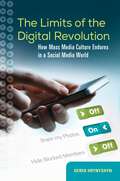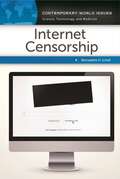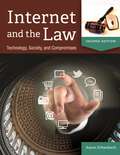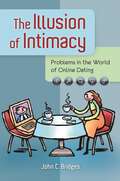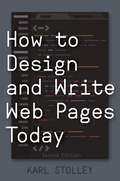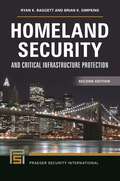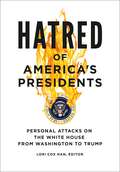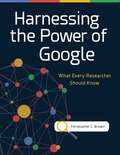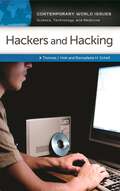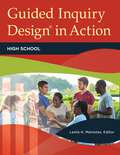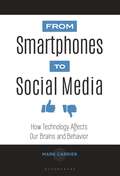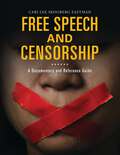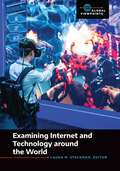- Table View
- List View
Power Searching the Internet: The Librarian's Quick Guide
by Nicole HennigLearn how to help your library patrons deepen their internet searches to more effectively find information, images, videos, statistics, maps, books, definitions, translations, and more.You know how to dash off a quick Google search, but do you know how to go further with your searching to get everything you actually need? Written in an engaging, conversational tone, this handy guide introduces you to shortcuts and some of the hidden features and filters offered by many search tools—such as limiting by site, domain, or date—and to several free but little-known search tools. With concrete examples and practical how-to tips, you'll learn to effectively search Google, Wolfram Alpha, social media platforms, and other internet search tools—and how to teach your patrons to do the same. The information comprised in this volume can be easily shared with patrons to help them in their searches and may be used in information literacy courses.
Podcasting with Youth: A Quick Guide for Librarians and Educators
by Lucas MaxwellLearn how to set up a student-led podcast in your library, involve staff from several subject areas, market effectively, what challenges you are likely to face, and how podcasting will benefit the students and school overall.Podcasting from the library is a growing movement. Podcasting with Youth teaches librarians and educators how to set up, develop, market, and deliver a successful youth-led podcast from their library. Putting youth in control when interviewing authors and other guests develops their leadership and technical skills and brings new users to the library to engage in a unique library activity. This program can be set up relatively cheaply, and readers will learn how to use the technology required to deliver a podcast. Sound recording equipment, microphones, mixers, and audio files may be intimidating to some librarians and educators; this book quells those fears by explaining the technology in a straightforward, how-to manner. It also includes student input on what podcasters have learned, the challenges they have faced, and their plans for the future. Author Lucas Maxwell offers many helpful tips to librarians who want to learn how to create a program that puts students in charge and allows them to produce a tangible product that their peers will be interested in.
Online Health and Safety: From Cyberbullying to Internet Addiction
by Bernadette H. SchellThis book explores 10 unique facets of Internet health and safety, including physical safety, information security, and the responsible use of technology, offering takeaways from interviews with experts in the field and suggestions for proactively improving users' Internet safety.The Internet has become for many people—especially students and young adults—an essential and intrinsic part of their lives. It makes information available to be shared worldwide, at any time; enables learning about any topic; and allows for instantaneous communication. And it provides endless entertainment as well. But the benefits of online access are accompanied by serious potential risks. This book covers the key elements of Internet health and safety, including physical safety, information security, and the responsible use of technology. It begins with an introductory essay that gives readers the necessary conceptual framework, and then explains specific topics such as cyberbullying, file sharing, online predators, Internet fraud, and obscene and offensive content. The book also answers readers' questions in a "Q & A" section with a subject expert and includes a directory of resources that provides additional information and serves as a gateway to further study.
Online around the World: A Geographic Encyclopedia of the Internet, Social Media, and Mobile Apps
by Laura M. Steckman and Marilyn J. Andrews, EditorsCovering more than 80 countries around the world, this book provides a compelling, contemporary snapshot of how people in other countries are using the Internet, social media, and mobile apps.How do people in other countries use the social media platform Facebook differently than Americans do? What topics are discussed on the largest online forum—one in Indonesia, with more than seven million registered users? Why does Mongolia rate in the top-ten countries worldwide for peak Internet speeds? Readers of Online around the World: A Geographic Encyclopedia of the Internet, Social Media, and Mobile Apps will discover the answers to these questions and learn about people's Internet and social media preferences on six continents—outside of the online community of users within the United States. The book begins with an overview of the Internet, social media platforms, and mobile apps that chronologically examines the development of technological innovations that have made the Internet what it is today. The country-specific entries that follow the overview provide demographic information and describe specific events influenced by online communications, allowing readers to better appreciate the incredible power of online interactions across otherwise-unconnected individuals and the realities and peculiarities of how people communicate in today's fast-paced, globalized, and high-technology environment. This encyclopedia presents social media and the Internet in new light, identifying how the use of language and the specific application of human culture impacts emerging technologies and communications, dramatically affecting everything from politics to social activism, education, and censorship.
News Literacy: The Keys to Combating Fake News
by Michelle Luhtala Jacquelyn WhitingAt a time when misinformation in the media is abundant, this book explains the difficulty in nurturing students to become critical researchers and offers practical lessons that empower students to excavate information that will help them learn.This guide to teaching news literacy explores a wealth of resources and classroom-tested lessons that educators in grades 7–12 can use in their own libraries and classrooms. To introduce the concept of news literacy, the authors explain the steps of the inquiry and research process in detail and examine the Stanford History Education Group (SHEG) 2016 report "Evaluating Information: The Cornerstone of Civic Online Reasoning" and related research studies.Lesson plans corresponding to each stage of the process are coordinated to relevant standards from the CCSS and ISTE and are accompanied by rubrics for providing students feedback on their progress as well as samples of student work as it evolved through the stages. Furthermore, the authors' anecdotal insights from their experiences in collaboratively implementing the lessons with colleagues are an invaluable addition for any librarian seeking to work with teachers to help students become critical researchers.
MOOCs Now: Everything You Need to Know to Design, Set Up, and Run a Massive Open Online Course
by Susan W. Alman and Jennifer JumbaLearn from experts who have created and presented Massive Open Online Courses (MOOCs) that can reach a vast audience, and discover how to develop and present this new online form of continuing education.MOOCs (Massive Open Online Courses) have become popular with eager learners as well as some educators wanting to test the boundaries of learning. Understandably, many educators approach MOOCs with trepidation and a number of questions. Are MOOCs simply a fad? Does this new venue threaten traditional higher education models? How are teachers to be remunerated for their efforts? And what can be done about student retention in an anonymous venue of a MOOC?This book answers these questions and many more, offering a practical and realistic guide to MOOCs—one that will help anyone involved in higher education to better understand MOOCs and enable them to make decisions about whether and how to offer MOOCs. The authors address topics such as the various costs of offering a MOOC (teachers, developers, licensing, and software), explain accessibility options, examine the challenges of copyright and the administration required, and explore what the librarian's role should be. This insightful guide also explains your options for the presentation of text, video, and audio content; whether to give assignments or tests; and how to decide whether you should offer your MOOC for free or require a fee and offer a certificate upon course completion.
The Limits of the Digital Revolution: How Mass Media Culture Endures in a Social Media World
by Derek HrynyshynThis academic analysis explores social media, specifically examining its influence on the cultural, political, and economic organization of our society and the role capitalism plays within its domain.In this examination of society and technology, author and educator Derek Hrynyshyn explores the ways in which social media shapes popular culture and how social power is expressed within it. He debunks the misperception of the medium as a social equalizer—a theory drawn from the fact that content is created by its users—and compares it to mass media, identifying the capitalist-driven mechanisms that drive both social media and mass media. The work captures his assessment that social media legitimizes the inequities among the social classes rather than challenging them.The book scrutinizes the difference between social media and mass media, the relationship between technologies and social change, and the role of popular culture in the structure of political and economic power. A careful look at social media networks such as Facebook, Twitter, and Google suggests that these tools are systems of surveillance, monitoring everyday activities for the benefit of advertisers and the networks themselves. Topics covered within the book's 10 detailed chapters include privacy online, freedom of expression, piracy, the digital divide, fragmentation, and social cohesion.
Library Services for Online Patrons: A Manual for Facilitating Access, Learning, and Engagement
by Joelle E. Pitts Laura Bonella Jason M. Coleman Adam WathenThis practical and holistic approach to offering library resources and services to online patrons addresses multiple areas of service to online patrons, including reference, instruction, access, and marketing.Academic libraries are wonderful resources for university students and faculty on campus, and public libraries thrive on providing targeted in-person services such as storytime, makerspaces, and adult programming. It can be easy, however, to forget about the large population of students, faculty, and community members who access library resources and use library services remotely.Library Services for Online Patrons reaches out to patrons who are not—or not always—located on campus or who seldom—if ever—visit libraries' physical facilities and who may not be aware of or able to equitably use library services. The authors focus on ways to organize library resources using principles of design and to cater library services to the specific needs of online students, faculty, and community members. They also address how to effectively target marketing to the online population and how to collaborate with campus and community stakeholders who work directly with them.
Library Patrons' Privacy: Questions and Answers
by Sandra J. Valenti Brady D. Lund Matthew A. BeckstromA quick, easy-to-read synthesis of theory, guidelines, and evidence-based research, this book offers timely, practical guidance for library and information professionals who must navigate ethical crises in information privacy and stay on top of emerging privacy trends.Emerging technologies create new concerns about information privacy within library and information organizations, and many information professionals lack guidance on how to navigate the ethical crises that emerge when information privacy and library policy clash. What should we do when a patron leaves something behind? How do we justify filtering internet access while respecting accessibility and privacy? How do we balance new technologies that provide anonymity with the library's need to prevent the illegal use of their facilities? Library Patrons' Privacy presents clear, conversational, evidence-based guidance on how to navigate these ethical questions in information privacy. Ideas from professional organizations, government entities, scholarly publications, and personal experiences are synthesized into an approachable guide for librarians at all stages of their career. This guide, designed by three experienced LIS scholars and professionals, is a quick and enjoyable read that students and professionals of all levels of technical knowledge and skill will find useful and applicable to their libraries.
Library Information Systems (Library and Information Science Text Series)
by Joseph R. Matthews Carson BlockInformation systems are central to libraries, and managing information systems is critical to serving library communities. Both a textbook for LIS courses and a handbook for practitioners, this volume thoroughly addresses modern libraries' challenges of integrating information technology.Written by Joseph R. Matthews and Carson Block, both experts on library information systems, this book describes the evolution of library information systems, their enabling technologies, and today's dynamic IT marketplace. It explains specific technologies and related topics, including standards and standards organizations, telecommunications and networks, integrated library systems, electronic resource management systems, repositories, authentication and link verification, electronic resources, and nextgen library systems.Readers will also learn the latest about information systems management, covering technology planning, basic technology axioms, the impact of technology on library services, system selection and implementation, system usability, and general technology management. The final section considers current trends and future developments in LIS, including those related to mobile devices and apps as well as the growth of digital libraries.
Libraries Supporting Online Learning: Practical Strategies and Best Practices
by Christina D. MuneUsing practical examples from librarians in the field, this book lays out current issues in online learning and teaches librarians how to adapt a variety of library services—including instruction, reference, and collection development—to online education.Recent studies highlighting the challenges faced by online learners show that skills librarians are uniquely qualified to teach, such as information and digital literacy and source evaluation, can improve academic performance in online courses and enhance the online learning experience. Just as embedded librarianship was developed to answer the needs of online courses when they emerged in the early 2000s, online learning librarian Christina Mune now teaches "online librarianship" as a set of realistic strategies for serving a variety of online education models. Each chapter of Libraries Supporting Online Learning addresses a different strategy for supporting online students and/or faculty, with all strategies derived from real-world practices. Librarians will find information on best practices for creating digital literacy tutorials and dynamic content, providing patrons with open access and open educational resources, helping patrons to avoid copyright issues, promoting peer-to-peer learning and resource sharing, posting to social media, and developing scalable reference services. The tools and practical examples in this book will be useful for all educators interested in increasing the efficacy of online learning.
Librarian's Guide to Online Searching: Cultivating Database Skills for Research and Instruction
by Christopher C. BrownUpdates the premier textbook for students and librarians needing to know the landscape of current databases and how to search them.Librarians need to know of existing databases, and they must be able to teach search capabilities and strategies to library users. This practical guide introduces librarians to a broad spectrum of fee-based and freely available databases and explains how to teach them.The updated 6th edition of this well-regarded text covers new databases on the market as well as updates to older databases. It also explains underlying information structures and demonstrates how to search most effectively. It introduces readers to several recent changes, such as the move away from metadata-based indexing to full text indexing by vendors covering newspaper content. Business databases receive greater emphasis.As in the previous editions, this book takes a real-world approach, covering topics from basic and advanced search tools to online subject databases. Each chapter includes a thorough discussion, a recap, concrete examples, exercises, and points to consider, making it an ideal text for courses in database searching as well as a trustworthy professional resource.
Introduction to Cybercrime: Computer Crimes, Laws, and Policing in the 21st Century (Praeger Security International Textbook)
by Joshua B. Hill Nancy E. MarionExplaining cybercrime in a highly networked world, this book provides a comprehensive yet accessible summary of the history, modern developments, and efforts to combat cybercrime in various forms at all levels of government—international, national, state, and local.As the exponential growth of the Internet has made the exchange and storage of information quick and inexpensive, the incidence of cyber-enabled criminal activity—from copyright infringement to phishing to online pornography—has also exploded. These crimes, both old and new, are posing challenges for law enforcement and legislators alike. What efforts—if any—could deter cybercrime in the highly networked and extremely fast-moving modern world? Introduction to Cybercrime: Computer Crimes, Laws, and Policing in the 21st Century seeks to address this tough question and enables readers to better contextualize the place of cybercrime in the current landscape.This textbook documents how a significant side effect of the positive growth of technology has been a proliferation of computer-facilitated crime, explaining how computers have become the preferred tools used to commit crimes, both domestically and internationally, and have the potential to seriously harm people and property alike. The chapters discuss different types of cybercrimes—including new offenses unique to the Internet—and their widespread impacts. Readers will learn about the governmental responses worldwide that attempt to alleviate or prevent cybercrimes and gain a solid understanding of the issues surrounding cybercrime in today's society as well as the long- and short-term impacts of cybercrime.
Internet Censorship: A Reference Handbook (Contemporary World Issues)
by Bernadette H. SchellCovering topics ranging from web filters to laws aimed at preventing the flow of information, this book explores freedom—and censorship—of the Internet and considers the advantages and disadvantages of policies at each end of the spectrum.Combining reference entries with perspective essays, this timely book undertakes an impartial exploration of Internet censorship, examining the two sides of the debate in depth. On the one side are those who believe censorship, to a greater or lesser degree, is acceptable; on the other are those who play the critical role of information freedom fighters. In Internet Censorship: A Reference Handbook, experts help readers understand these diverse views on Internet access and content viewing, revealing how both groups do what they do and why.The handbook shares key events associated with the Internet's evolution, starting with its beginnings and culminating in the present. It probes the motivation of newsmakers like Julian Assange, the Anonymous, and WikiLeaks hacker groups, and of risk-takers like Private Bradley Manning. It also looks at ways in which Internet censorship is used as an instrument of governmental control and at the legal and moral grounds cited to defend these policies, addressing, for example, why the governments of China and Iran believe it is their duty to protect citizens by filtering online content believed to be harmful.
Internet and the Law: Technology, Society, and Compromises
by Aaron SchwabachThe world of Internet law is constantly changing and is difficult to follow, even for those for whom doing so is a full-time job. This updated, everything-you-need-to-know reference removes the uncertainty.Internet and the Law: Technology, Society, and Compromises, Second Edition is the go-to source for anyone who needs clear explanations of complex legal concepts related to online practices and content. This wide-ranging, alphabetical reference explores diverse areas of law, including territorial jurisdiction and taxation, that are relevant to or affected by advances in information technology and the rise of the Internet. Particular emphasis is placed on intellectual property law and laws regarding freedom of expression. The Internet, as this book shows, raises questions not only about how to protect intellectual creations, but about what should be protected. Entries also discuss how the Web has brought First Amendment rights and free expression into question as society grapples with attempts to control "leaks" and to restrict content such as pornography, spam, defamation, and criminal speech.
The Illusion of Intimacy: Problems in the World of Online Dating
by John C. BridgesThis book examines online dating from the "inside," using in-depth interviews with dating website members to reveal—and keenly analyze—what relationships and romance in the 21st century are really like.The members of the current generation of "digital guinea pigs" are true social pioneers as they embrace digital technology to create a new realm of mating, dating, and intimacy in America. Ironically, "digital dating" frequently results in an outcome that is exactly opposite to its participants' intended purposes. The Illusion of Intimacy: Problems in the World of Online Dating is more than a thorough investigation of the realities of modern relationships, many of which begin online—one in five, according to Match.com; the book introduces the reader to some of the natives and industry "users" who make up its clientele. Author John C. Bridges shows how they have adapted to technology to find new interactions, meet new partners, and share new experiences. The research focuses on the dating sites ranked in the top five by actual members of these sites who interviewed with the author to share their personal stories and experiences, all documented by saved emails and text messages.
How to Design and Write Web Pages Today
by Karl StolleyThis unique guidebook lays the foundations of contemporary mobile-first, responsive web design, offering writers, designers, and those who teach them a complete and up-to-date approach to web design.Are you looking to learn web design the right way? Not by using an off-the-shelf software package, but by creating customized sites in a way that gives you full control? This guide provides that ability even if you have no previous coding skills or experience.One of the critical challenges of modern web design is being able to write for the mobile web to reach those increasingly mobile-connected users. How to Design and Write Web Pages Today addresses this key objective while also explaining how to deliver improved experiences for users of desktop-style devices based on the constraints and challenges of mobile design. This user-friendly tutorial begins with background information to enable a better understanding of the web and its purpose and function as well as how to generate material for a website. Readers then learn about the three overarching concerns in the short- and long-term viability and usefulness of websites: accessibility, usability, and sustainability. Key technologies and techniques for web design—such as the HTML and CSS languages to the conceptual foundations of grid-based design—are next, followed by a thorough explanation of how to publish a site on the open web, from creating a viable site architecture to automating the publishing of content to the open web.
Homeland Security and Critical Infrastructure Protection (Praeger Security International)
by Ryan K. Baggett Brian K. SimpkinsA compelling overview of systems and strategies implemented to safeguard U.S. resources from a plethora of threats, the vulnerabilities and security gaps in these infrastructure systems, and options to enable the future security of the homeland.Since the first edition of this book was published in 2009, significant changes have occurred in the security landscape, both domestically and internationally. This second edition is thoroughly updated to reflect those changes, offering a complete review of the various security and resilience measures currently in place and potential strategies to safeguard life and property within the U.S. homeland. As noted in the U.S. Department of Homeland Security's National Preparedness Goal, the mission area of protection is vital to the homeland in its focus on actions to protect people, vital interests, and our nation's way of life. With that in mind, this book discusses strategies such as risk analysis and assessment, information sharing, and continuity planning. The authors focus on relevant and timely threats and hazards facing specific infrastructure components including, but not limited to, agriculture and food, banking and finance, water, energy, telecommunications, and transportation. The dynamic posture of critical infrastructure security and resilience (CISR) underscores the importance of an integrated, layered all-hazards approach. In describing this approach, the book includes new chapters on planning and guidance, public and private partnerships, cyber issues and threats, and careers in infrastructure protection. Additions such as discussion questions, learning objectives, and fundamental concepts for each chapter provide additional direction for instructors and students alike.
Hatred of America's Presidents: Personal Attacks on the White House from Washington to Trump
by Lori Cox HanThis work examines expressions of personal hostility and animosity toward presidents—even beloved ones—throughout American history and their impact on policymaking, politics, and culture.People involved or simply interested in politics often ask whether today's political environment is more toxic than ever before. Hatred of America's Presidents: Personal Attacks on the White House from Washington to Trump presents an impartial and authoritative history of invective toward the White House so readers can determine the answer for themselves.The book focuses on the most representative and commonplace attacks of a vitriolic and personal nature, detailing who instigated and trafficked in the attacks and how presidents, administrations, and political parties defended themselves. It also illustrates how honest disagreements about policy—such as FDR's New Deal, Ronald Reagan's Central America policies, George W. Bush's invasion of Iraq, and Barack Obama's Affordable Care Act—fueled expressions of hatred and condemnation. Finally, the book includes perspectives from both the right and the left on the legitimacy of these attacks and the victims' defenses as well as their impact on American politics and policy.
Harnessing the Power of Google: What Every Researcher Should Know
by Christopher C. BrownThis informative and practical book teaches how to get better and faster results from Internet searches and methods for maximizing the potential of the world's most popular search engine.Mastering Internet research skills is a must for today's information professionals and LIS students, as well as for educators and all high school and college students. But without specific instruction in how to conduct online research, people are destined to waste time in their Internet queries or to come up emptyhanded when the information they're seeking is, in fact, available. Harnessing the Power of Google: What Every Researcher Should Know offers simple strategies that streamline research and improve anyone's search results. It will specifically benefit information professionals, students, and academic researchers in disciplines like international studies, political science, and statistical research. Illustrated with helpful screen shots, this handbook will be an often-consulted desk reference and can serve as a workshop guide or supplementary reading in courses on online research skills.The book starts with a review of general guidelines for searching that covers topics like the difference between primary and secondary sources, determining authority, citing sources, indexing, and ranking before addressing Google's power-searching features, such as the ability to search by top-level Internet domain or file type. The book describes the history of information access over the past century, culminating in today's digital information archives and how Google now augments—not replaces—what libraries provide. The three Google interfaces that together comprise a powerful toolkit are covered in detail: Google Web for finding primary source materials; Google Scholar for full text searching of scholarly, peer-reviewed material; and Google Books for searching the full text of a very high percentage of books.
Hackers and Hacking: A Reference Handbook (Contemporary World Issues)
by Thomas J. Holt Bernadette H. SchellThis book provides an in-depth exploration of the phenomenon of hacking from a multidisciplinary perspective that addresses the social and technological aspects of this unique activity as well as its impact.What defines the social world of hackers? How do individuals utilize hacking techniques against corporations, governments, and the general public? And what motivates them to do so? This book traces the origins of hacking from the 1950s to today and provides an in-depth exploration of the ways in which hackers define themselves, the application of malicious and ethical hacking techniques, and how hackers' activities are directly tied to the evolution of the technologies we use every day.Rather than presenting an overly technical discussion of the phenomenon of hacking, this work examines the culture of hackers and the technologies they exploit in an easy-to-understand format. Additionally, the book documents how hacking can be applied to engage in various forms of cybercrime, ranging from the creation of malicious software to the theft of sensitive information and fraud—acts that can have devastating effects upon our modern information society.
Guided Inquiry Design® in Action: High School (Libraries Unlimited Guided Inquiry)
by Leslie K. ManiotesEdited by the cocreator of the Guided Inquiry Design® (GID) framework as well as an educator, speaker, and international consultant on the topic, this book explains the nuances of GID in the high school context. It also addresses background research and explains guided inquiry and the information search process.Today's students need to be able to think creatively to solve problems. They need to be in learning environments that incorporate collaboration, discussion, and genuine reflection to acquire these kinds of real-world skills. Guided Inquiry Design® in Action: High School gives teachers and librarians lesson plans created within the proven GID framework, specifically designed for high school students, and provides the supporting information and guidance to use these lesson plans successfully.You'll find the lesson plans and complete units of Guided Inquiry Design® clear and easy to implement and integrate into your existing curriculum, in all areas, from science to humanities to social studies. These teaching materials are accompanied by explanations of critical subjects such as the GID framework, using Guided Inquiry as the basis for personalized learning, using inquiry tools for assessment of learning in high school, and applying teaching strategies that increase student investment and foster critical thinking and deeper learning.
From Smartphones to Social Media: How Technology Affects Our Brains and Behavior
by Mark CarrierThis book examines how today's technology, as it includes smartphones, computers, and the internet, shapes our physical health, cognitive and psychological development, and interactions with one another and the world around us.Technology has become a ubiquitous part of modern life, but its impact on our physical, psychological, and social health and development runs just as deep as does our dependence upon it. How is the development of babies' brains affected by their playing with their parents' smartphones and tablets? How have computers altered the way we process and learn information? How have texting and social networking sites such as Facebook changed the way in which we interact with others? Can online dating lead to meaningful real-world relationships? From Smartphones to Social Media investigates these questions and many complex issues related to technology. Readers will discover what researchers know about how the use of technology affects us through accessibly written, thematic chapters. The main text is complemented by a collection of case studies and interviews with a variety of experts, providing insight into how technology's positive and negative effects manifest in our everyday lives and what we can do to mediate the negative ones.
Free Speech and Censorship: A Documentary and Reference Guide (Documentary and Reference Guides)
by Cari Lee EastmanThis annotated document collection surveys the history and evolution of laws and attitudes regarding free speech and censorship in the United States, with a special emphasis on contemporary events and controversies related to the First Amendment.The United States' collective understanding of First Amendment freedoms was formed by more than 200 years of tensions between the power of word and the power of the government. During that time, major laws and legal decisions defined the circumstances and degree to which personal expression could be rightfully expressed—and rightfully limited.This struggle to define the parameters of free speech continues today. Vibrant and passionate debates about First Amendment limitations once inspired by the dissemination of birth control information now address such issues as kneeling during the national anthem, removing controversial books from public libraries, attempts by the Trump administration to discredit the press, and disseminating false or hateful information through social media platforms. By exploring diverse examples of censorship victories and triumphs of free expression, readers will better understand the enormous impact of First Amendment freedoms on American society.
Examining Internet and Technology around the World (Global Viewpoints)
by Laura M. SteckmanThis book offers comparative insights into the challenges and opportunities surrounding emerging technology and the internet as it is used and perceived throughout the world, providing students with cross-cultural and cross-national perspectives.The United Arab Emirates has a national goal of colonizing Mars by 2117, and China seeks to modernize its entire manufacturing process to produce cutting-edge technologies and research advances by 2025. How are other countries using the internet and emerging technologies to their advantage? This volume in the Global Viewpoints series examines 10 issues pertaining to the internet and technology, including access and censorship, alternative energy technologies, artificial intelligence, autonomous robots, cyberbullying, cybercrime, e-learning, GMOs, online privacy, and virtual and augmented reality. For each topic, the volume features eight country-level perspectives that span the world to allow for comparisons of different nations' specific approaches to the technology or issue. This encyclopedia takes a new direction in understanding the importance and impact of emerging technologies on the world, showing that even when experiencing similar technologically related challenges or advances, these technologies do not form one-size-fits-all solutions for every nation and population. Even when nations develop similar technologies, human dimensions—from policy to social norms to culture—influence people and society across the world differently.






